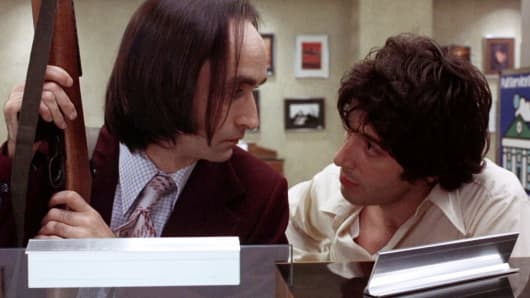The Trump Administration's economic policies remind me of the Al Pacino film, "Dog Day Afternoon."
It was based on the true story of a bank robbery gone bad, largely because of the slap-dash approach to the crime, the lack of contingency planning and the fundamental incompetence of the two hapless criminals, Sonny and Sal, who tried and failed to steal some cold hard cash.
In the movie, Sonny, (played by Pacino, who played Michael Corleone in "The Godfather") insists he "had a plan," when challenged by the hostages they'd taken during the course of the robbery. But that plan was ill-considered, ill-timed and, as it becomes painfully obvious over the course of the flick, doomed to failure.
His sidekick, Sal, (played by John Cazale, aka Fredo in "The Godfather") chose Wyoming as the country to which he would like to escape as the two were planning the robbery. Sonny had to remind him that Wyoming was not a country.
Trade trade negotiations with China appear to have a similarly chaotic and incoherent framework.
Treasury Secretary Steven Mnuchin said on "Fox News Sunday" that a trade war has been averted for now, noting that, "we have an agreement with China that they will substantially agree" to bring down the $375 billion trade surplus with the U.S.
His counterparts in the U.S. Trade Representative's office, however, indicate that imposing over $150 billion worth of tariffs on Chinese-made goods remained a near-term option.
What's that about having a plan?
Like "Dog Day Afternoon," the humorous overtones of bumbling bank robbers can be amusing at points along the way, like the scene when Sonny allows the female hostages to practice twirling his rifle as if it posed no threat to the hostage-takers themselves and meanwhile federal agents are putting together an elaborate plan to take the robbers down.
Again, the Trump administration's economic team seems to be at odds with itself, ignoring large and small details, failing to adequately prepare and having no alternative plan (though plenty of alternative facts) while Chinese negotiators are playing the long game for the win.
It would be comical were it not so damn serious.
The U.S. has legitimate trade-related issues with China over the never-ending theft of U.S.-created intellectual property and with the sensitive technology transfers the Chinese demand of U.S. companies that wish to gain entrance to their vast market.
Instead of focusing on items central to a plan that would be more successful in the long run, like changing China's behavior in this regard, the Trump administration is focused solely on the merchandise trade deficit with China, which is a paltry percentage of this nation's GDP.
It appears, that China has agreed to buy more American agricultural goods and more energy products from the U.S. They need more of both, so this was less a strategic victory, or concession, than a statement of fact.
China needs to import more liquified natural gas (LNG) from the U.S. to meet its ever increasing energy needs and is already a major buyer of soybeans and other farmed goods from the West, as it lacks sufficient arable land to produce the kind of agricultural surpluses found here at home.
Whether or not this represents a "win" for the U.S. remains to be seen, but the cooling of trade tensions has resulted in a relief rally on Wall Street.
Still, the president and the majority of his economic team fail to grasp how to win the much larger war over advanced technology, intellectual property, sustainable energy and cutting-edge mass transportation, all of which drive productivity and comparative advantage.
The stakes are high, but the negotiators fall short of the mark.
Unfortunately, this scenario also seems to be playing out on the geopolitical front, as the administration fumbles its reaction to posturing by Kim Jong Un, as well.
Again, internal divisions and distractions are making the U.S. look lost in a complex game where only the other side fully understands the rules of engagement.
Not to mix up two Academy award-winning movies, but it appears that characters like Sonny and Sal are heading both our global economic and foreign delegations, and the outcome is as predictable as the ending of a Hollywood movie.
And instead of having Don Corleone leading the entire team, we're stuck with Pacino's other most notable character sitting atop it all … and it ain't Corleone's brainy son Michael.



